Bypassing Filternets
help /In the United States, netizens enjoy internet access without restrictions put in place by the federal government. Despite constant threats to the Constitution and the Bill of Rights, the First Amendment aims to prevent the passage of laws that restrict the freedom of speech, while also respecting other freedoms: [1]:
Congress shall make no law respecting an establishment of religion, or prohibiting the free exercise thereof; or abridging the freedom of speech, or of the press; or the right of the people peaceably to assemble, and to petition the government for a redress of grievances.
There is no reason, however, why other countries, companies, or schools cannot filter the internet.
What exactly is the internet, though?
What is the internet?
When people refer to "the Internet" what exactly are they talking about?
According to the Internet Society the Internet [2]
... is at once a world-wide broadcasting capability, a mechanism for information dissemination, and a medium for collaboration and interaction between individuals and their computers without regard for geographic location.
So, according to the Internet Society, the internet is a mechanism that allows you to tell everyone in the world, regardless of their physical location, something, while at the same time it's a thing that allows you to collaborate and interact with those same people.
If, however, you ask people (in the United States, for example) what the internet is, most would probably respond with a few of their favorite websites including Google.com, Youtube.com, Facebook.com, or Instagram.com. We can see this clearly in Alexa's top site list for the US. These are websites that have built the concept of the Internet, in the United States.
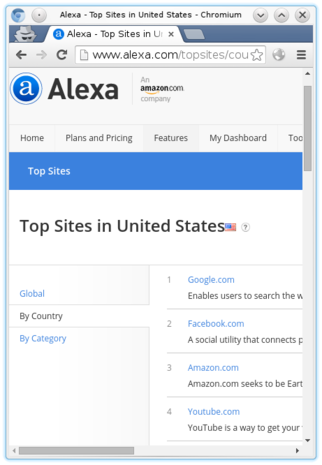 |
What about in other countries? What are some popular sites around the world?
In South Korea, Naver.com, a local search engine, tops the list of most popular sites on Alexa.
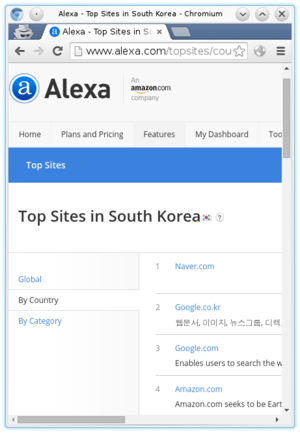 |
In Russia, Yandex, a local search engine, tops the list of most popular sites on Alexa.
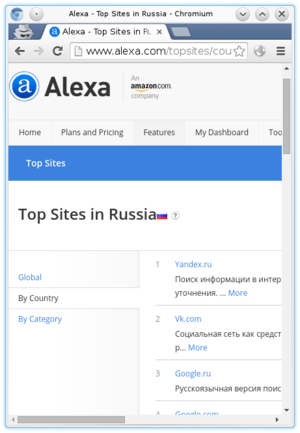 |
In, Germany, Google.de, a Google localization, tops the list of most popoular sites on Alexa.
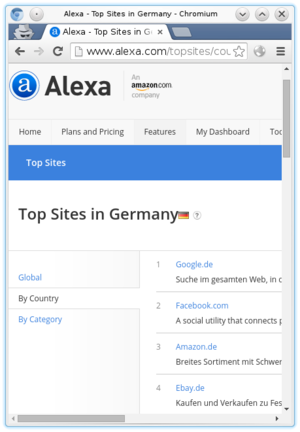 |
In China, Baidu.com, a local search engine, tops the list of most popular sites on Alexa.
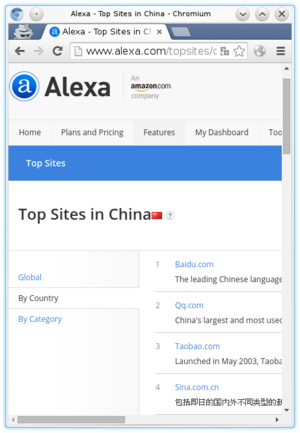 |
Although, the underlying technologies that build the internet remain the same, access to websites and therefore what people think of when they say "the Internet," isn't the same in every country around the world.
As we can see, popular websites in one country are not so popular in other countries. Why is that?
We've listed a three probable reasons why the popularity of websites differ across countries or political and geographical borders.
- Language and other cultural factors - Locally created websites that understand and cater to local populations will always be more popular than foreign "imports," so to speak.
- Speed - Websites are usually slower outside of their origin country because most do not have servers in every country around the world.
- The filternet - This is the most sinister of reasons why websites are not popular in certain countries, but what is the filternet exactly?
What is a filternet?
We use the word filternet to represent all types of filtered internet access around the world. The internet is commonly filtered by companies, schools, governments or other institutions for a variety of reasons including:
- to prevent exfiltration of proprietary information,
- to stop people from speaking out and organizing against the government, and even
- to help keep kids on top of their schoolwork by restricting access to common social networks.
In coming weeks, we'll be posting articles that detail:
- How internet filtering or the filternet works
- Reasons why certain governments, schools, and companies, filter internet access
For now, let's find out the fastest method to bypass the filternet.
How do I bypass the filternet?
Although, many methods exist to bypass the filternet, the easiest and fastest, zero configuration method bypass the filternet is to use web proxies.
Web proxies are special websites that might remain unblocked on certain networks. Unlike other methods to bypass the filternet, they do not require complex configuration, credit cards, or even login information. All you need to use a web proxy is a URL of a blocked website and the web proxy's URL.
We have a list of web proxies on our proxy privacy list page that is displays some of the most popular web proxies right now. slowfruit.net also functions as a web proxy. Just visit our home page at slowfruit.net, enter a URL in the box, and click "Defeat it!"
Notes
- http://www.law.cornell.edu/constitution/first_amendment
- http://www.internetsociety.org/internet/what-internet/history-internet/brief-history-internet the internet